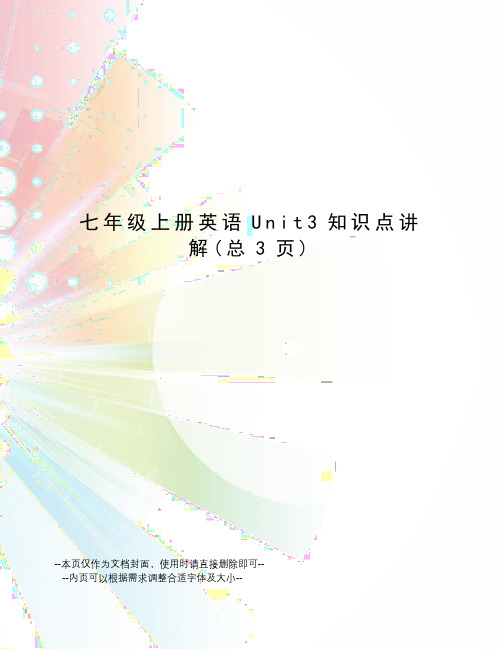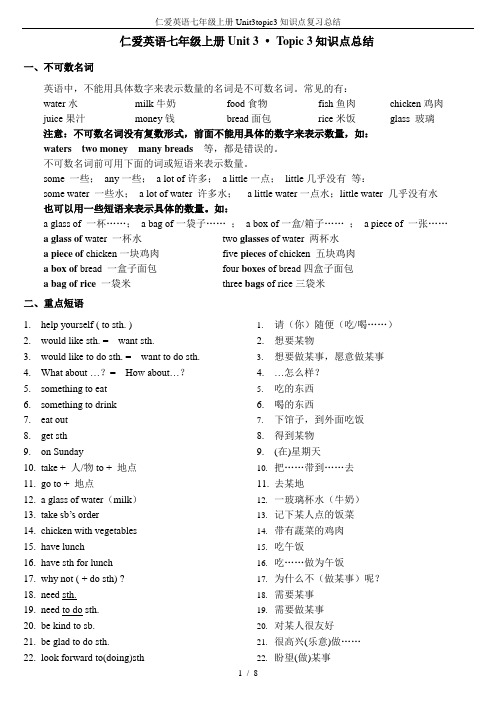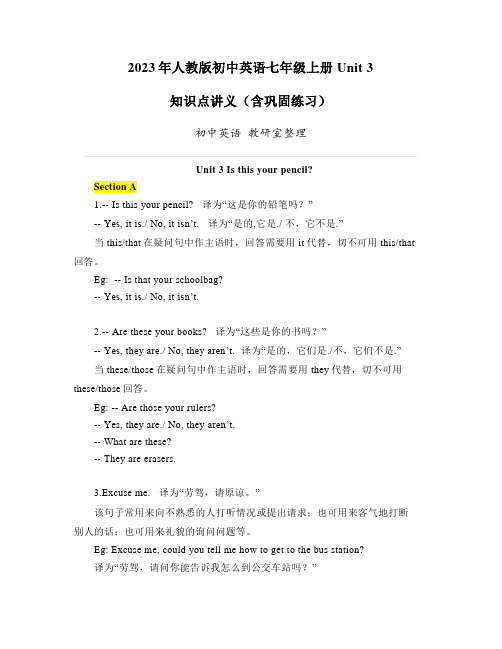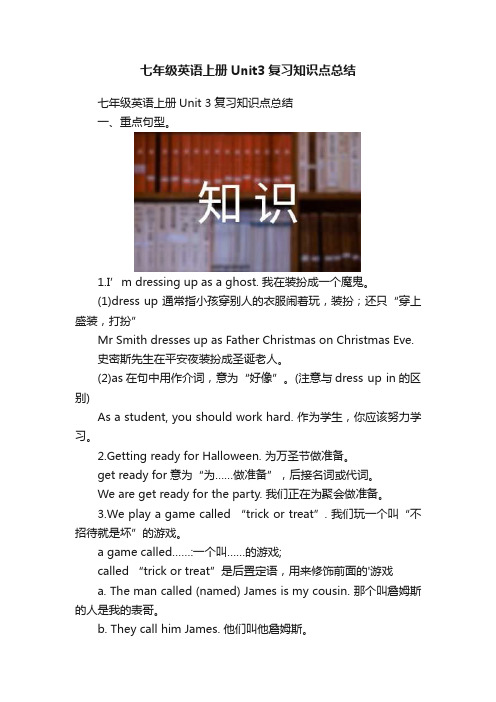七年级上册英语Unit3知识点讲解复习进程
七年级上册英语Unit3知识点讲解

七年级上册英语U n i t3知识点讲解(总3页)--本页仅作为文档封面,使用时请直接删除即可----内页可以根据需求调整合适字体及大小--Unit3 知识点讲解一.these和those一般用作指示代词,单独做主语。
是this的复数形式。
它指较近的两个或两个以上的人或物,意为“这些”。
如:These are my pens. 这些是我的钢笔。
是that的复数形式。
它指较远的两个或两个以上的人或物,意为“那些”。
如:Those are her rulers. 那些是她的直尺。
these和those也可用在名词前做限定词,意为“这/那些”。
后接be动词are。
如:These girls are my friends.这些女孩是我的朋友。
Those books are blue.那些书是蓝色的。
二.This is his sister. 这位是他的姐姐。
1. 当第三者给双方做介绍时,通常用”this is +姓名”这个句型,在这种场合不说she is …/he is …如:David, this is my mother.大卫, 这是我妈妈。
2.向别人介绍第三者,并指远处的人时,应用that’s….,意思为“那位是….”。
如:---- Who’s th at?---- It’s my brother.3.当你向别人介绍两个或两个以上的人时,常说:These are….These are my sisters and brothers三. —Is Guo Peng your brother郭鹏是你的弟弟吗?—No, he isn’t. 不,他不是。
对主语是人(单数和复数意义)的一般疑问句作简略回答时,要用相应的人称代词he或she或they代替问句中表示人的名词或代词。
如:—Is Zhao Lei your sister?赵蕾是你的妹妹吗?—Yes, she is. 是的,她是—Is your father a teacher?你的父亲是一名教师吗?—No,he isn’t.不,他不是—Are these students clever 这些学生聪明吗—Yes,they ,they aren’t.是的,他们是。
仁爱英语七年级上册Unit3topic3知识点复习总结

仁爱英语七年级上册Unit3topic3知识点复习总结仁爱英语七年级上册Unit 3 •Topic 3知识点总结一、不可数名词英语中,不能用具体数字来表示数量的名词是不可数名词。
常见的有:water水juice果汁milk牛奶money钱food食物bread面包fish鱼肉rice米饭chicken鸡肉glass 玻璃注意:不可数名词没有复数形式,前面不能用具体的数字来表示数量,如:waters two money many breads 等,都是错误的。
不可数名词前可用下面的词或短语来表示数量。
some 一些;any一些;a lot of许多;a little一点;little几乎没有等:some water 一些水;a lot of water 许多水; a little water一点水;little water 几乎没有水也可以用一些短语来表示具体的数量。
如:a glass of 一杯……;a bag of一袋子……;a box of一盒/箱子……;a piece of 一张……a glass of water 一杯水a piece of chicken一块鸡肉a box of bread 一盒子面包a bag of rice一袋米two glasses of water 两杯水five pieces of chicken 五块鸡肉four boxes of bread四盒子面包three bags of rice三袋米二、重点短语1.help yourself ( to sth. )2.would like sth. = want sth.3.would like to do sth. = want to do sth.4.W hat about …?= How about…?5.something to eat6.something to drink7.eat out8.get sth9.on Sunday10.take + 人/物to + 地点11.go to + 地点12.a glass of water(milk)13.take sb’s order14.chicken with vegetables15.have lunch16.have sth for lunch17.why not ( + do sth) ?18.need sth.19.need to do sth.20.be kind to sb.21.be glad to do sth.22.look forward to(doing)sth 1.请(你)随便(吃/喝……)2.想要某物3.想要做某事,愿意做某事4.…怎么样?5.吃的东西6.喝的东西7.下馆子,到外面吃饭8.得到某物9.(在)星期天10.把……带到……去11.去某地12.一玻璃杯水(牛奶)13.记下某人点的饭菜14.带有蔬菜的鸡肉15.吃午饭16.吃……做为午饭17.为什么不(做某事)呢?18.需要某事19.需要做某事20.对某人很友好21.很高兴(乐意)做……22.盼望(做)某事短语详解1.help yourself. 请(你)随便.help yourself to sth. 请(你)随便吃/喝……如:Help yourself to some fish. Tom. 汤姆,请随意吃些鱼肉。
人教版初中英语新教材七年级上starterUnit3知识点归纳总结(复习必背)

!(知识讲解)Section A What is fun in a yard?potatoThat shop sells different kinds of pens.那家商店出售不同种类的钢笔。
【拓展】kind还可作形容词,意为“和蔼的;亲切的”,be kind to sb意为“对某人友好”。
常用句型:It is kind of sb to do sth.某人做某事真是太好了。
My teacher is kind to me.我的老师对我很好。
It's very kind of you to help me.你能帮我真是太好了。
2.Let me count.让我数一数。
(教材第16页1b)count[动词]数数Can you count from one to one hundred?你能从1数到100吗?3.Another duck is behind the big tree.另一只鸭子在大树后面。
(教材第16页1b)another[形容词]另一;又一(人或事物)此处作形容词,也可作代词,泛指同类事物中三者或三者以上中的“另一个”,只能修饰或代替单数可数名词。
Would you like another apple?你想再要一个苹果吗?I don't like this one.Please show me another.我不喜欢这个。
请给我看另一个。
【拓展】“another+数词+可数名词复数”意为“另外几个······”,相当于“数词+more+可数名词复数”。
We need another five persons to help us.=We need five more persons to help us.我们还需要五个人来帮忙。
4.What else can you see on the farm?你在农场里还能看到其他的什么东西?(教材第17页2b)else[副词]其他的;别的else用在something、anything、nothing等不定代词或疑问词的后面。
新译林版英语七年级(初一)上册Unit 3知识点归纳总结

新译林版七年级(初一)上册英语Unit 3知识点归纳总结一、词汇知识点整理:on foot 步行 far away from 远离a few 一些,少量 learn about 学得,获知would like sth/to do sth 想要/想要做某事after class 下课后on this day 在今天all kinds of 各种各样on the phone 在电话中look at 看ground floor 底层,一楼on the wall 在墙上 by bus 乘公共汽车in front of 在……前面 let me see 让我看看go to school 去上学reading room 阅览室borrow from 从……借……get to school 到达学校on the Open Day 在开放日二、结构用法:Thank you for doing sth 为做某事而感谢你be ready to do sth 准备做某事It takes sb some time to do sth 花费某人多少时间做某事show sb around 领某人参观need to do sth 需要做某事三、句式用法:1.Which of the subjects do you like best, Eddie? P30 Eddie,(在所有科目中,你最喜欢哪一科?subjects 是复数。
= What’s your favourite subject ? 你最喜欢哪一科目?这个句型subject用单数。
subject 科目(9科):Chinese 语文Math数学English英语History历史Biology生物Geography 地理Music 音乐Art美术PE体育.2. --- What’s the date today ? P 31 今天几号?(date, 日期,问日期)回答用--- It’s 9 October/ It’s October 9. (它是)十月九日。
Unit3知识点讲义人教版英语七年级上册

2023年人教版初中英语七年级上册Unit 3知识点讲义(含巩固练习)初中英语教研室整理Unit 3 Is this your pencil?Section A1.-- Is this your pencil? 译为“这是你的铅笔吗?”-- Yes, it is./ No, it isn’t. 译为“是的,它是./ 不,它不是.”当this/that在疑问句中作主语时,回答需要用it代替,切不可用this/that 回答。
Eg: -- Is that your schoolbag?-- Yes, it is./ No, it isn’t.2.-- Are these your books? 译为“这些是你的书吗?”-- Yes, they are./ No, they aren’t. 译为“是的,它们是./不,它们不是.”当these/those在疑问句中作主语时,回答需要用they代替,切不可用these/those回答。
Eg: -- Are those your rulers?-- Yes, they are./ No, they aren’t.-- What are these?-- They are erasers.3.Excuse me. 译为“劳驾,请原谅。
”该句子常用来向不熟悉的人打听情况或提出请求;也可用来客气地打断别人的话;也可用来礼貌的询问问题等。
Eg: Excuse me, could you tell me how to get to the bus station?译为“劳驾,请问你能告诉我怎么到公交车站吗?”4.What about ... = How about... 译为:“...怎么样/...呢?”注意:后面需要接名词、代词或动名词。
Eg: What/How about you? 译为“你呢?”What/How about this dress? 译为“这件连衣裙怎么样?”What/ How about going swimming? 译为“去游泳怎么样?”5.Thank you for your help. 译为“谢谢你的帮助。
七年级英语unit3上册知识点

七年级英语unit3上册知识点七年级英语Unit 3上册知识点在初中英语教学中,七年级的Unit 3是非常重要的一个单元,其中包含了许多重要的语法、词汇以及口语表达技巧。
以下是本单元中的知识点总结:一、重要词汇1. family:家庭例句:I love spending time with my family.2. favorite:最喜欢的例句:What's your favorite color?3. friend:朋友例句:My best friend is going to America tomorrow.4. hobby:爱好例句:My hobby is playing basketball.5. like:喜欢例句:I like ice cream very much.6. music:音乐例句:I enjoy listening to all kinds of music.7. sport:运动例句:My favorite sport is tennis.二、重要语法1. 现在进行时:be + V-ing现在进行时表示正在进行或发生的动作,通常带有动作正在进行的强调,常用的时间状语有now, at the moment。
例句:I am watching TV now.2. 物主代词:my, your, his, her, its, our, their物主代词通常在句子中作定语或宾语,用来表示所有关系。
例句:This is my book.3. 一般现在时:主语+V原形+其他一般现在时用来表示经常性的行为,通常与时间状语always, usually, often等连用。
例句:I usually get up at 6 o'clock in the morning.4. 反意疑问句:附加疑问句反意疑问句用来征求听话者的同意或者确认。
如果前面的陈述句是肯定句,附加疑问句则使用否定疑问句,反之亦然。
七年级英语上册Unit3复习知识点总结

七年级英语上册Unit3复习知识点总结七年级英语上册Unit 3复习知识点总结一、重点句型。
1.I’m dressing up as a ghost. 我在装扮成一个魔鬼。
(1)dress up 通常指小孩穿别人的衣服闹着玩,装扮;还只“穿上盛装,打扮”Mr Smith dresses up as Father Christmas on Christmas Eve.史密斯先生在平安夜装扮成圣诞老人。
(2)as在句中用作介词,意为“好像”。
(注意与dress up in的区别)As a student, you should work hard. 作为学生,你应该努力学习。
2.Getting ready for Halloween. 为万圣节做准备。
get ready for意为“为……做准备”,后接名词或代词。
We are get ready for the party. 我们正在为聚会做准备。
3.We play a game called “trick or treat”. 我们玩一个叫“不招待就是坏”的游戏。
a game called……:一个叫……的游戏;called “trick or treat”是后置定语,用来修饰前面的'游戏a. The man called (named) James is my cousin. 那个叫詹姆斯的人是我的表哥。
b. They call him James. 他们叫他詹姆斯。
4. We knock on people’s doors and shout “trick or treat”.(1) knock on people’s doors 意为“敲人家的门”,此处on可以用at 代替。
The teacher knocks on(at) his desk.(2) shout可以和at或者to连用,意为“朝着……喊叫”Don’t shout at others. It’s not polite. 不要朝别人喊叫,这是不礼貌的5. Usually, they give us some candy as a treat. 通常他们都用糖果招待我们。
2024新人教版七年级上册英语Starter Unit 3知识点梳理及语法讲义(教师版)

Starter Unit 3 Welcome ! 知识点与语法精讲精练(一) 完成单词名词: 1. 院子;园圃 __yard __ 2. 胡萝卜 __carrot __ 3. 鹅 __goose __4. 植物 __plant __5. 动物 __animal __6. 花 __flower __7. 湖 __lake __ 8. 农场 __farm __动词: 1. 数数 __count __介词: 1. 在...后面 __behind __形容词: 1. 漂亮的;美丽的 __beautiful __副词: 1. 其他的;别的 __else __ 2. 大声地 __aloud __兼类词:1. (名词) 乐趣;快乐 (形容词) 有趣的;使人快乐的 __fun __2. (形容词/代词) 另一;又一(人或事物) __another __3. (名词) 玩笑;(动词) 开玩笑 __joke __4. (形容词) 许多的;(代词) 许多人;(名词) 许多人 __many __(二) 词语变形1. Fun (n. 乐趣;快乐) -- (形容词) __funny __2. Goose (n. 鹅) -- (复数形式) __geese __3. That (pron. 那;那个) -- (复数形式) __those(那些)__ -- (对应词) __this(这个)__4. This (pron. 这;这个) -- (复数形式) __these(这些)__ -- (对应词) __that(那个)__5. Chicken (n. 鸡) -- (复数形式) __chickens __6. It (pron. 它) -- (复数形式) __they __7. Baby (n. 婴儿) -- (复数形式) __babies __8. Potato (n. 土豆) -- (复数形式) __potatoes __9. Tomato (n. 西红柿) -- (复数形式) __tomatoes __10. Farm (n. 农场) -- (名词) __farmer(农民)__11. Beautiful (adj. 美丽的) -- (名词) __beauty(美丽;美人)__(三) 短语互译1. 看;瞧 __look at __2. 鸡仔 __baby chickens __3. 苹果树 __apple tree __4. 写下__write down__5. 什么动物__what animal__6. 什么植物__what plant__7. 多少__how many__ 8. 注意做某事__pay attention to doing sth.__9. 把...放进...里__put...in...__ 10. 去湖边__go to the lake__11. 跟我来__come with me__ 12. 听音乐__listen to music__13. 讲笑话__tell jokes__ 14. 玩得高兴__have fun__ 15. 在农场上__on a farm__ 16. 把...介绍给... __introduce... to...__ 17. 许多种动物__many kinds of animals__18. 让我数一数__Let me count__ 19. 看那__look there__ 20. 还有什么__what else__ 21. 练习做某事__practise doing sth.__ 22. 在庭院里__in a yard__Section A What is fun in a yard?1.What is fun in a yard? 庭院里有什么好玩的?【用法详解】Fun (不可数名词) “乐趣;快乐”(形容词) “有趣的”常见搭配:have fun = have a good time = enjoy oneself 玩得高兴,过得愉快Have fun doing sth. 做某事很开心Eg: We had fun at the party last night. = We had a good time at the party last night.= We enjoyed ourselves at the party last night. 我们昨天在派对上玩得很开心。
- 1、下载文档前请自行甄别文档内容的完整性,平台不提供额外的编辑、内容补充、找答案等附加服务。
- 2、"仅部分预览"的文档,不可在线预览部分如存在完整性等问题,可反馈申请退款(可完整预览的文档不适用该条件!)。
- 3、如文档侵犯您的权益,请联系客服反馈,我们会尽快为您处理(人工客服工作时间:9:00-18:30)。
Unit3 知识点讲解
一.these和those一般用作指示代词,单独做主语。
1.these是this的复数形式。
它指较近的两个或两个以上的人或物,意为“这些”。
如:These are my pens. 这些是我的钢笔。
2.those是that的复数形式。
它指较远的两个或两个以上的人或物,意为“那些”。
如:Those are her rulers. 那些是她的直尺。
these和those也可用在名词前做限定词,意为“这/那些”。
后接be动词are。
如:These girls are my friends.这些女孩是我的朋友。
Those books are blue.那些书是蓝色的。
二.This is his sister. 这位是他的姐姐。
1. 当第三者给双方做介绍时,通常用”this is +姓名”这个句型,在这种场合
不说she is …/he is …如:
David, this is my mother.大卫, 这是我妈妈。
2.向别人介绍第三者,并指远处的人时,应用that’s….,意思为“那位是….”。
如:
---- Who’s that?
---- It’s my brother.
3.当你向别人介绍两个或两个以上的人时,常说:These are….
These are my sisters and brothers
三. —Is Guo Peng your brother? 郭鹏是你的弟弟吗?
—No, he isn’t. 不,他不是。
对主语是人(单数和复数意义)的一般疑问句作简略回答时,要用相应的人称代词he或she或they代替问句中表示人的名词或代词。
如:—Is Zhao Lei your sister?赵蕾是你的妹妹吗?
—Yes, she is. 是的,她是
—Is your father a teacher?你的父亲是一名教师吗?
—No,he isn’t.不,他不是
—Are these students clever ?这些学生聪明吗?
—Yes,they are.No,they aren’t.是的,他们是。
四.Thanks for the photo of your family.谢谢你的全家福照片
1.Thanks for…… =Thank you for……,表示“因……而感谢(你)”。
for 是介词,后加名词或动名词(即:动词的-ing形式)。
如
Thanks for your help = Thanks for helping me.谢谢你的帮助
Thanks for your flowers.谢谢你的花。
2.the photo of your family意为“你的全家福照片”,其中的of表示“……的”,它常用来表示无生命的名词的所有关系。
如:
a map of China 一张中国地图
the legs of the table这张桌子的腿
the walls of the room.这个房间的墙
3.表示有生命的名词的所有关系时要用 (’s形式)如:Tony’s pen
My father’s jacket.
4.family 作为一个整体时,意思是“家庭”,后面谓语动词用单数形式。
如把family看作家庭成员时,应理解为复数,意为“一家人”,后面的谓语动词
用复数形式。
My family are very well. 我的家人都很健康。
My family is small. 我的家庭是个小家庭。
五.Here is my family photo!这是我的全家福照片!
这是一个倒装句,句子中如果出现here(这儿),there(那儿),常将它们放在句首,用倒装句式。
如果主语是名词,则用完全倒装“Here+be动词+名词(主语)”。
如果主语是代词,则用部分倒装“Here+代词(主语)+ be 动词”。
这里的主语是后边的名词或代词,所以be动词用am,is还是are,要和后面的名词或代词的人称和数保持一致。
如
Here is her pen.她的钢笔在这儿。
There is my father.我的父亲在那儿。
There they are.他们在那儿。
六.它们的一般疑问句在回答时不直接用these, those, 而是用they来代替上
文的指示代词,以避免使用中的词汇重复;
—Excuse me, are these your apples?打扰一下,这些是你的苹果吗?—Yes, they are. / No, they aren’t.是,是的。
/不,不是。
—Are those Betty’s grandparents?那是贝蒂的爷爷奶奶吗?
—Yes, they are. And these are her parents.是啊,这是她的爸爸妈妈。
七.第三人称单数的代词he,she,it的用法
1.用来代替男性。
如:
My father, a boy , Mr Wang ,his brother,Jim(吉姆),Tony(托尼)等。
e.g:Jim is my brother.He is fourteen years old.(he指代Jim)
吉姆是我的弟弟,他14岁了。
Mr Wang is a teacher.He likes playing football.(he指代Mr wang)王先生是一名教师,他喜欢踢足球
2.she用来代替女性。
如:
a waman , my sister , a girl , Miss Chen , kelsey(凯思) , Jane(简)等。
e.g:—Who is that girl ? 那个女孩是谁?
—She is kate.(she代替that girl)她是凯特。
His sister is a student.She is in Class 5,Grade 7.(she代替his sister)
他的妹妹是一名学生,她在七年级五班。
3.it用来代替动物、植物、或无生命的事物、数据、自然现象、时间、距离以及不知性别的人。
如:
e.g: My pencil is in the pencil case.It is yellow.(it代替my pen)
我的铅笔在铅笔盒里。
它是黄色的。
Her bike is blue.It is new.(it代替her bike)
她的自行车是蓝色的。
它是新的。
It’s a baby.(it代替baby)是一个小婴儿。
—what’s the time.几点钟了?
—It’s eight o’clock.八点钟了。
(It代替the time)
八.单数可数名词变为复数名词的规则:(见课本第95页)(要记熟)。
